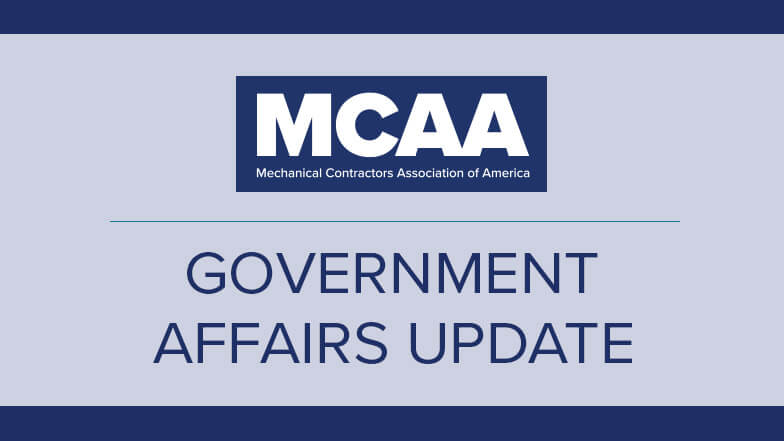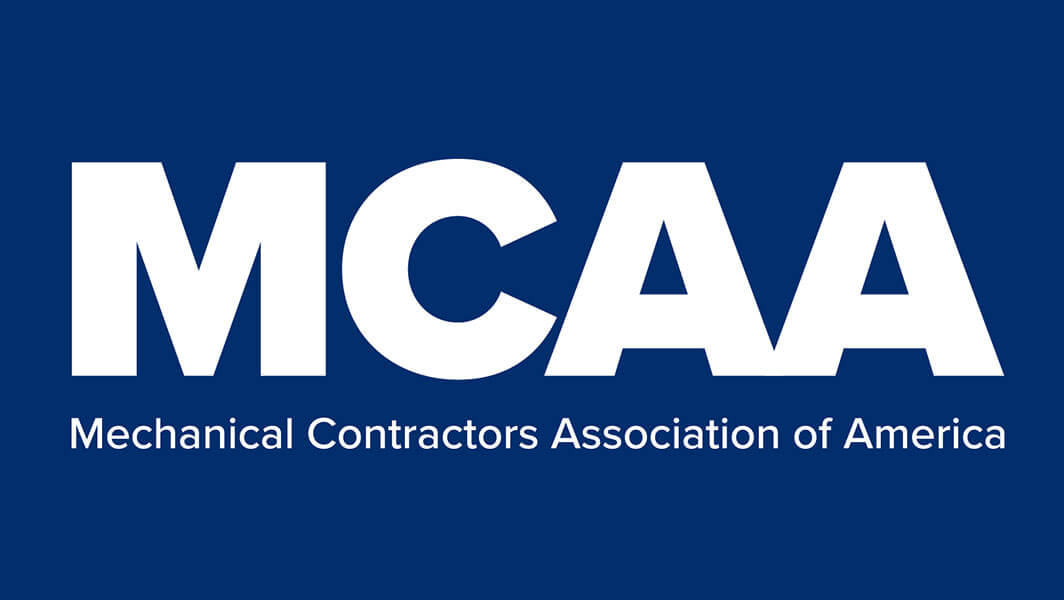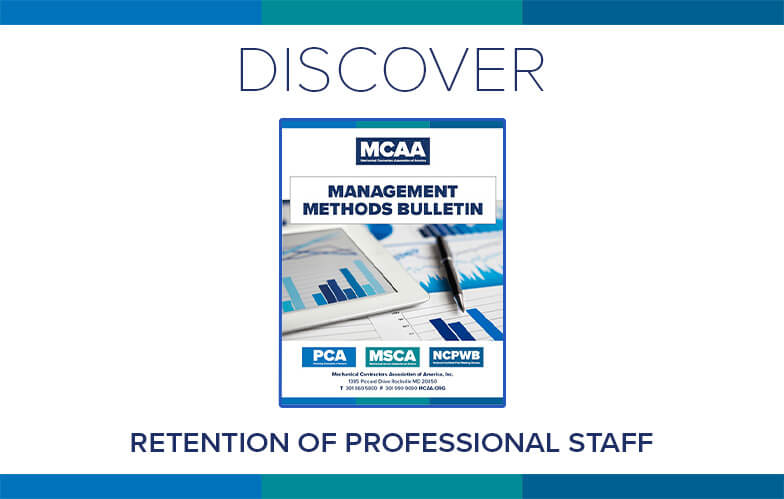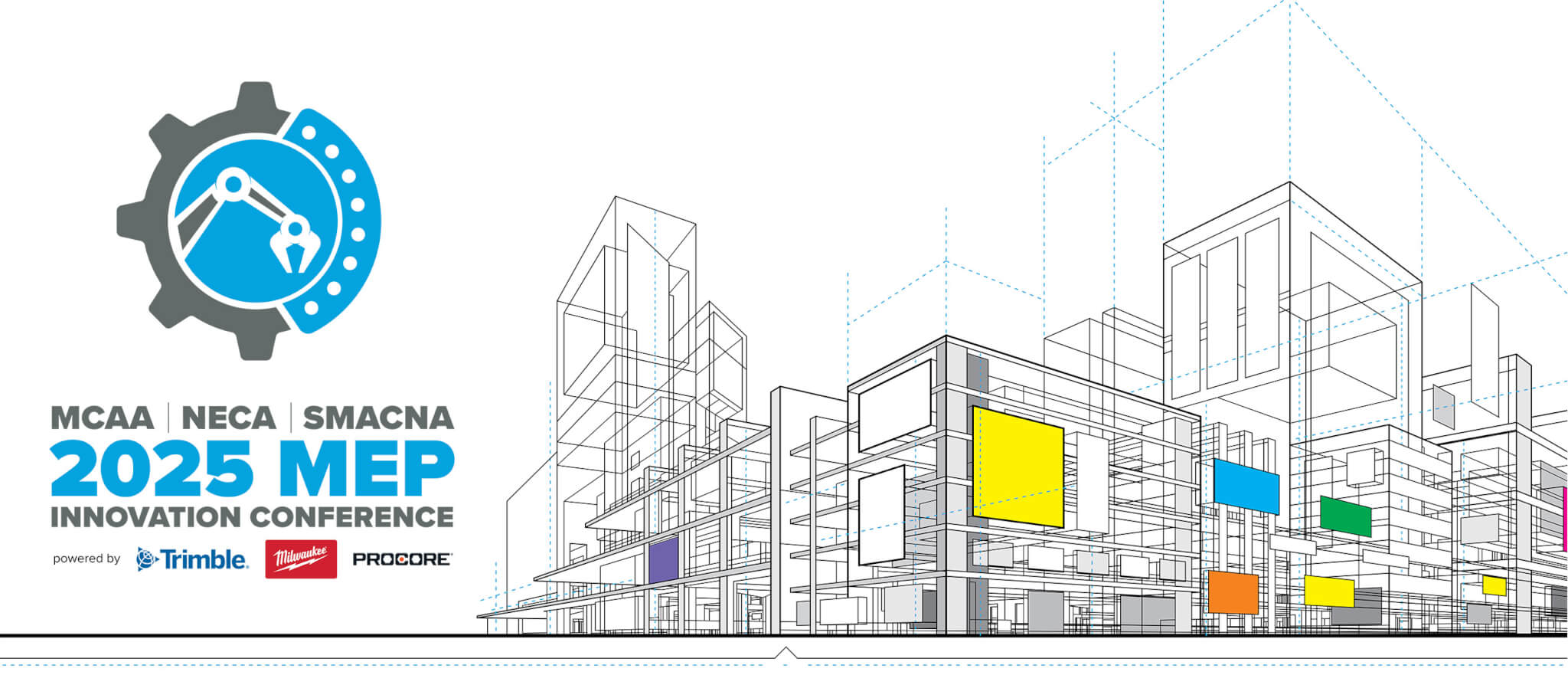
As part of its ongoing commitment to protecting your livelihood and setting the stage for a bright future, MCAA has secured the services of Longbow Public Policy Group to advise our MCAA Government Affairs Committee (GAC). GAC Chair, Jim Gaffney will be passing along information relative to our industry on a regular basis.
On Friday, May 24, 2024 MCAA Lobbying Firm, Longbow Public Policy Group provided the following information:
MCAA Issues and Interests
Project Labor Agreements
MCAA Successfully Advocates for Defeat of Gaetz Anti-PLA Amendment During NDAA Markup
As the MCAA policy team continues its advocacy in support of project labor agreements, we were engaged this week in advocating to defeat a last-second amendment offered by Rep. Matt Gaetz (R-FL) during Wednesday’s markup of the fiscal year 2025 National Defense Authorization Act (NDAA). Gaetz’s amendment would have barred application of President Biden’s MCAA-supported Executive Order on Project Labor Agreements to Department of Defense construction projects. In the Armed Services Committee, Amendments do not have to be pre-filed like they must be in other committees. Fearing there could be surprise amendments on MCAA priorities like Davis-Bacon and PLAs during the House NDAA mark-up (as we have seen in past years) we monitored the Committee action. Within minutes of Rep. Gaetz offering the amendment, the policy team reached out to Republican lawmakers on the House Armed Services Committee to make them aware of the MCAA’s strong opposition to the Gaetz amendment. Given the Republican majority on the Committee we knew we had to get some Republicans on our side to defeat the amendment. This lobbying effort proved successful when the Committee voted 26-31 to defeat the amendment after all Democrats and four moderate Republicans we targeted—Reps. Mike Turner (OH), Don Bacon (NE), Nick LaLota (NY), and Brad Finstad (MN)—voted in opposition. We were also pleased to see that MCAA longtime allies, Reps. George Norcross (NJ) and Andy Kim (NJ) rose in real time to argue against the amendment during the Committee proceedings. This gave us confidence that Committee Democrats would be unified so we could focus on the moderate Republicans the few hours we have between the amendment being offered and the vote on it.
Davis-Bacon Federal Prevailing Wage
This week, we continued our outreach to ensure opposition to the Congressional Review Act resolution to rescind the MCAA-supported Final Davis-Bacon rule. We remain confident that we can defeat this Resolution if it is brought to a vote.
Registered Apprenticeship
This week we used some new data as an excuse to make another foray on our concerns about the impact aspects of DOL’s proposed apprenticeship rule could have on our high-quality apprenticeship training programs. Specifically, we used the fact that this week Pew Research Center and Gallup published new surveys revealing that Americans are losing faith in the value of a college degree. According to the surveys, 29% of Americans say that college is not worth the cost and 49% say having a four-year college degree is less important for landing a high-paying job today than it was 20 years ago. We explained that the willingness of more young people to consider career tracks that do not involve college makes it more important than ever to maintain the quality and integrity of our programs. And then we reviewed how they are threatened by aspects of the DOL rulemaking. It was a good paradigm shift that gave us a renewed opportunity to hit this issue again.
Independent Contractors and Misclassification of Workers
We continued our lobbying against the Congressional Review Act (CRA) resolution to nullify the MCAA-supported independent contractor rule. As we meet with lawmakers and staff we are also keeping an eye on the handful of lawsuits challenging the rule that are ongoing. We expect there could be a ruling in one or more of them before this summer.
Pension Reform
As the MCAA policy team continues discussions with the House Education and the Workforce Committee regarding MCAA’s priority issues, including pension reform, we wanted to highlight that the acrimony on the committee around pensions reached a new level Wednesday. This resulted from House Education and the Workforce Committee Chair Virginia Foxx (R-NC) and Health, Employment, Labor, and Pensions Subcommittee Chair Bob Good (R-VA) ratcheting up their war on unions by sending letters to Acting Labor Secretary Su, NABTU President Sean McGarvey, National Electrical Benefit Fund (NEBF) Investments Executive Director Kevin McCormack, NEBF trustees Lonnie R. Stephenson, David Long, Kenneth W. Cooper and Dennis F. Quebe, AFL-CIO President Liz Shuler, IAFF General President Edward Kelly, and NEA President Rebecca S. Pringle attacking them and seeking information about an April 23, 2024 White House meeting launching an initiative encouraging pension funds to leverage their investments to advance fair pay and basic labor standards.
The letters argue that “diverting pension fund assets to promote collective bargaining is contrary to statutory protections for pension funds subject to ERISA” and request documents and communications related to preparation for and participation in the April 23 meeting. It also requests as all legal opinions or memoranda used to justify the Labor Department’s position that the use of pension fund assets subject to ERISA to “promote labor union interests” is lawful.
We are relieved that no MCAA funds were implicated in this foray, but we do need to watch what develops from it.
Reforms to Federal Contracting Process
Engaging on Senate Bill to Reauthorize Water Resources Development Act
As noted above, we made progress this week pressing for reauthorization of the 2024 Water Resources Development Act (WRDA). We also had activity on MCAA’s legacy work in connection with government contracting reform. Ahead of Wednesday’s markup in the Senate Environment and Public Works (EPW) Committee of the WRDA reauthorization bill we were informed that neither the Chair or Ranking Member would support our effort to attach S. 2928, the “Water Infrastructure Subcontractor and Taxpayer Protection Act,” as an amendment. This bill would establish payment and performance bonding requirements for projects funded under the Water Infrastructure Finance and Innovation Act (WIFIA). It is something that MCAA supported in the past through the alliance John McNerney started years ago with the coalition led by the Surety & Fidelity Association of America.
As we discussed during the GAC meeting a couple of weeks ago, we’ve been working with the larger coalition to have the text of S. 2928 included in the WRDA Reauthorization. Despite the coalition’s efforts and those of the primary sponsors (Sens. Mark Kelly (D-AZ) and Kevin Cramer (R-ND)) with Senate EPW Chair Tom Carper (D-DE) and Ranking Member Shelley Moore Capito (R-WV), S. 2928 was left out of the bipartisan base text that Carper and Capito released late last Friday night. Last weekend and early this week, the policy team did outreach to Sen. Kelly (D-AZ) (who sits on EPW) to request that he put the bill forward as an amendment to the WRDA text. While Kelly was willing to do so, he received pushback from both the EPW Committee’s majority and minority staffs, who said that any amendment that wasn’t strictly related to the Army Corps of Engineers’ WRDA jurisdiction would be opposed by Carper and Capito during the markup. S. 2928 certainly applies beyond these parameters set by the Chair and Ranking Member for WRDA amendments, and Kelly and Cramer declined to press the issue. The agreement between Carper and Capito on amendments played out during the markup, as the only real amendment adopted was to rename the bill after Chair Carper who is retiring at the end of the year, and the bill passed Committee with a 19-0 vote.
While S. 2928 was left out of WRDA as it heads to the Senate floor, the silver lining is that EPW Committee staff tell us they would devote time to help advance S. 2928 if Kelly and Cramer are willing to send up a letter making a special request for the Committee to process on the bill as a standalone measure. That letter is now being put together and we’ll be sure to provide an update on next steps. There’s also discussion about seeing if there is a pathway to include the House companion bill (H.R. 1740) in the House version of WRDA scheduled to be marked up by the House Transportation and Infrastructure Committee sometime in June as primary bill sponsor Rep. Mike Bost (R-IL) sits on that Committee.
Biden Attempts to Lock In Democrat Majority at NLRB Post-2024 Election
Yesterday, President Joe Biden renominated National Labor Relations Board (NLRB) Chair Lauren McFerran for a new five-year term that would end in 2029 and packaged her nomination with Republican Joshua Ditelberg to fill a term that ends in 2027. If the Senate confirms the nomination package, it will ensure Democrats retain a majority on the NLRB through the four years covering most of the term of whoever is elected President in November. Ditelberg is a partner in Seyfarth Shaw’s Chicago office. His practice focuses on labor and employment matters arising from corporate mergers, acquisitions, and divestitures; subcontracting and outsourcing; workforce reductions; facility closings, relocations, and consolidations; corporate reorganizations; bankruptcy; and Employee Stock Ownership Plans (ESOPs). He also co-chairs Seyfarth’s Workplace Restructuring and Transactions group.
We are skeptical this package will be confirmed. Within hours of the nominations being announced, some of the big business groups made known to Senate Republican leaders their view that they oppose locking in a majority of Biden-nominated NLRB members well into the next Presidential Administration. They do not want to foreclose the prospect of getting a more sympathetic majority if Trump should win and will press Republicans to filibuster this package if it gets through Committee and leader Schumer brings it to the Senate floor.
Water Infrastructure – EPA Issues Alert Regarding Cyber Threats to Drinking Water Systems
We wanted to be sure you saw that on Monday, the Environmental Protection Agency (EPA) issued an enforcement alert outlining urgent cybersecurity threats and vulnerabilities to community drinking water systems and the steps these systems need to take to comply with the Safe Drinking Water Act (SDWA). The alert is part of a government-wide effort, led by the National Security Agency and Cybersecurity and Infrastructure Security Agency, to reduce infrastructure and cybersecurity vulnerabilities.
This alert follows a March meeting that that U.S National Security Advisor, Jake Sullivan, and EPA Administrator Michael Regan had with state officials about cyberattacks that foreign adversaries and criminal hacking groups are perpetrating against U.S. water infrastructure that have the potential to disrupt the critical lifeline of clean and safe drinking water, as well as impose significant costs on affected communities. Recent EPA inspections revealed that over 70% of water systems do not fully comply with requirements in the SDWA and that some of those systems have critical cybersecurity vulnerabilities, such as default passwords that have not been updated and single logins that can be easily compromised.
The EPA states that it will increase the number of planned inspections and will take civil and criminal enforcement actions to ensure that water systems are meeting their requirements to regularly assess resilience vulnerabilities and develop emergency response plans.
Decarbonization
IRS Opens Portal for Second Funding Round of Qualified Advanced Energy Credit Program
On Wednesday, the Internal Revenue Service announced that the Biden Energy Department’s Qualified Advanced Energy Credit Program Applicant Portal (Section 48C Portal) is now open for applicants to register for Round 2 funding allocations. Qualified Advanced Energy Projects are those that: (1) re-equip, expand, or establish an industrial or manufacturing facility for the production or recycling of specified advanced energy products such as fuel cells, microturbines, or energy storage systems and components; (2) re-equip any industrial or manufacturing facility with equipment designed to reduce greenhouse gas emissions by at least 20 percent; or (3) re-equip, expand or establish an industrial facility for the processing, refining or recycling of critical materials. Per this notice, the second round of funding brings the 48C program to $6 billion, with approximately $2.5 billion going to projects in designated 48C “energy communities” (a map of these communities is available here). Interested manufacturers, including small-, medium-, and large-sized manufacturers, must submit concept papers by 5:00 pm June 21, 2024 using the 48C Portal here.
Other Interesting Things Since Our Last Report
Thursday, May 24th
- Sen. Rick Scott (R-FL) announced a bid to be the next Senate GOP leader, putting him in a three-way secret ballot race with Senate Minority Whip John Thune (R-SD) and Sen. John Cornyn (R-TX).
- The Federal Trade Commission (FTC) issued a joint request for information (RFI) with the Justice Department’s Antitrust Division seeking information from the public on serial acquisitions and roll-up strategies (i.e., corporate consolidation by buying smaller firms in the same or similar sectors or industries) in all sectors and industries, including but not limited to construction, housing, agriculture, professional service markets, and distribution businesses. The FTC and the Justice Department state in the RFI that “[o]nce these serial acquisition strategies are identified, the Agencies are committed to using the full scope of their statutory authorities to protect free and fair competition and prevent undue consolidation.” Per the RFI, the FTC is seeking comments from all sectors of the economy to provide input on a series of questions that fall under the general topics of: (1) examples of serial acquisitions; (2) the effects of serial acquisitions; (3) serial acquisition business practices; (4) the claimed business objectives of the serial acquisition strategy; and (5) ownership and control in serial acquisitions. Text of the RFI is available here.
- The Energy Department announced more than $25 million in funding from the Bipartisan Infrastructure Law through the Department’s Weatherization Assistance Program’s Enhance and Innovation Grant Program for 13 projects in New Hampshire, Oregon, Louisiana, Florida, Washington State, Michigan, New Mexico, Maine, Pennsylvania, New Jersey, Illinois, Maryland, and Georgia that collaborate with community partners to perform innovative and comprehensive energy-saving repairs and upgrades to make low-income homes more climate resilient and lower energy costs for families. The selected projects span three areas: (1) workforce development; (2) multifamily housing; and (3) single-family and manufactured housing.
- The Associated Builders and Contractors, the National Retail Federation, the National Federation of Independent Business, the International Franchise Association, and other business groups filed a lawsuit challenging the Department of Labor’s (DOL) final overtime rule in the U.S. District Court for the Eastern District of Texas. The employer groups assert that their members will have to “reclassify a massive amount of employees” under the revised new salary threshold and assert that the final rule “increases the minimum salary level threshold for exemption far beyond a level which the DOL is permitted to adopt” while also including “an unlawful automatic indexing provision that will further increase the salary threshold without the notice-and-comment rulemaking required by the Administrative Procedure Act.”
- The Senate voted 43-50 to reject the bipartisan immigration/border security bill, marking the second time the legislation has been blocked in a matter of months as Democrats look to shore up their record on immigration and give President Biden and incumbent Senators a boost in the process. Following the vote, President Biden issued a statement that the vote illustrated that Congressional Republicans “do not care about securing the border or fixing America’s broken immigration system” and that they “put partisan politics ahead of our country’s national security.” Senate Minority Leader Mitch McConnell (R-KY) responded saying, “The American people aren’t fooled. They know that the President’s summary reversal of commonsense border authorities is what invited this crisis. And they know the solution is not cynical Senate theater. The solution is a President who’s willing to exercise his authority, to use the tools he already has at his disposal, and to start cleaning up this mess. If Senate Democrats wanted to start fixing this crisis tomorrow, they would be urging the President to do exactly that.” The vote comes as Senate Majority Leader Chuck Schumer (D-NY) is beginning to shift into campaign mode as he schedules a series of messaging votes in the Senate on hot-button issues like border security and access to contraception.
Wednesday, May 23rd
- House Majority Leader Steve Scalise (R-LA) said that if former President Trump wins the presidency and Republicans win the Senate and keep the House, they will use the budget reconciliation process to retain the 2017 Tax Cuts and Jobs Act and to scale back Democratic-passed regulations on energy and other industries. Scalise said Republicans could also use reconciliation to shore up security at the U.S.-Mexico border by funding more border security agents, additional security technology, and the completion of a border wall.
- The Department of Labor (DOL) announced a settlement highlighting one of the first federal court cases outlining the relationship between the First Amendment and the anti-retaliation provision of the Fair Labor Standards Act. The case establishes that the First Amendment does not protect Bevins & Sons Inc., a Milton, Vermont-based excavation contractor, posting disparaging comments on Facebook about a worker after the company illegally terminated him for complaining about unpaid wages and saying he would report the unpaid wages to the “labor board.” The employee recovered $25,000 in punitive damages for the company’s retaliatory acts and $3,310 in wages and damages. The settlement also resulted in 17 other employees being paid $17,356 in overtime wages and damages.
Tuesday, May 22nd
- The Environmental Protection Agency (EPA) announced $25 million in Small, Underserved, and Disadvantaged Communities (SUDC) grant funding for states and territories to invest in clean and safe drinking water by upgrading infrastructure to comply with the Safe Drinking Water Act, reduce exposure to per- and poly-fluoroalkyl substances (PFAS), remove sources of lead, and address additional local drinking water challenges. To facilitate this work, the EPA also announced its selection of training and technical assistance providers that were awarded $30.7 million. These funds will be used to help water systems develop technical, financial, and managerial capacity and to assist private well owners in small and rural communities with improving water quality through actions such as testing for PFAS contamination.
- The Environmental Protection Agency (EPA) announced $14 million in funding through the Brownfields Job Training Programs for 20 grants of up to $500,000 each for non-profit and other eligible organizations to recruit, train, and retain a local workforce in environmental jobs, with priority given to unemployed and underemployed workers, including low-income individuals living in communities disproportionately impacted by solid and hazardous waste. The EPA will hold an outreach webinar here through Zoom on June 6, 2024 from 1:00 pm to 3:30 pm ET to explain the grant guidelines and to address commonly asked questions about this grant program.
Monday, May 21st
- The Environmental Protection Agency (EPA) announced $300 million from the President’s Bipartisan Infrastructure Law for Multipurpose, Assessment, and Cleanup (MAC) projects in 178 communities, 31 Revolving Loan Fund (RLF) grant programs, and RLF technical assistance to help states, local governments, and non-profit organizations to clean up polluted brownfield sites across the country. This funding allows the MAC grants’ maximum award amounts to increase from $500,000 to a new maximum of $5 million per award. A full list of grant recipients selected for fiscal year 2024 funding is available here and additional resources related to the grant funding, including grant fact sheets and a map with locations receiving funding, is available here.
- Pro-Israel super PAC Democratic Majority for Israel issued its first endorsements for three senators in battleground states—Sens. Bob Casey (D-PA), Jacky Rosen (D-NV), and Jon Tester (D-MT).
- The Democratic Congressional Campaign Committee (DCCC) announced it outraised the National Republican Congressional Committee (NRCC) in April with a record $12.4 million compared to $10 million for the NRCC.
Around the Country
Northeast
- On May 23rd, Philadelphia Congressman Dwight Evans (D-PA) said that he is in a rehabilitation facility recovering from a minor stroke and plans to return to voting in Washington, D.C. in about six weeks.
- On May 21st, the Department of Labor (DOL) announced that it secured $144,350 in overtime back wages and $15,000 in punitive damages from P&B Heating and Air Conditioning of West Babylon, New York for Fair Labor Standards Act violations and for retaliating against employees and threatening them with termination if they did not kick back the wage payments. DOL also obtained a temporary restraining order to forbid P&B Heating and Air Conditioning from retaliating against employees.
- On May 21st, Maryland GOP Senate candidate Larry Hogan released his first ad of the general election focused on abortion rights as he attempts to neutralize Democratic attacks on his abortion-rights record.
West
- On May 22nd, the Interior Department (DOI) announced $81 million in funding from the President’s Inflation Reduction Act for water conservation and drought resilience in California’s San Joaquin Valley to fund river restoration programs. Projects funded with this money include the creation of a “drought pool” providing water storage during drought seasons and establishing additional aquifer storage, work on recharge and recovery wells, improvements to existing surface storage, and expansion of conveyance capacity.
- On May 22nd, the Environmental Protection Agency (EPA) announced over $225 million in funding from the President’s Bipartisan Infrastructure Law and annual appropriations for water infrastructure projects to improve access to safe and reliable drinking water and wastewater services for American Indian Tribes and Alaska Native Villages. The selected projects include: (1) the planning, design, and construction of wastewater collection and treatment systems; (2) lead service line replacement projects; and (3) training and technical assistance for sustainable water systems.
- On May 22nd, the Congressional Leadership Fund, the GOP’s main House super PAC, is earmarking $30 million for an advertising barrage in California to protect vulnerable incumbents like Reps. John Duarte, Mike Garcia, and David Valadao.
- On May 21st, California Assemblymember Vince Fong (R) won the special election to fill former Speaker Kevin McCarty’s (R-CA) seat in California’s 20th Congressional District.
- On May 21st, Oregon state Rep. Maxine Dexter (D) defeated progressive Dr. Susheela Jayapal, Rep. Pramila Jayapal’s (D-WA) sister, in the Democratic primary for Oregon’s 3rd Congressional District. This comes as Oregon state Rep. Janelle Bynum (D) defeated progressive Jamie McLeod-Skinner in the Democratic primary for Oregon’s 5th Congressional District and will face Rep. Lori Chavez-DeRemer (R) in November.
Midwest
- On May 22nd, a Michigan farmworker became the second human to be infected with the current H5N1 bird flu virus. The farmworker had mild symptoms and has since recovered, Michigan health officials said. This comes as the Centers for Disease Control and Prevention (CDC) issued a readout of its call with state public health partners on avian influenza monitoring. The CDC recommends that influenza systems continue operating at enhanced levels during the summer and to increase the number of positive virus samples submitted for testing to help detect even rare cases of human avian influenza virus infection in the community.
- On May 18th, the Minnesota Republican Party unexpectedly endorsed Royce White to challenge Sen. Amy Klobuchar (D-MN) in the Minnesota U.S. Senate race. White is a former NBA player-turned-activist who is supported by Trump. He was a first-round NBA pick in 2012, but his career was cut short by “debilitating anxiety that included a fear of flying” and he ultimately played in just three NBA games for the Sacramento Kings. In 2022, White failed in his bid for the Republican nomination to run against Rep. Ilhan Omar (D) for Minnesota’s 5thCongressional District.
Southeast
- On May 23rd, U.S. Department of Commerce announced that it has committed $75 million from the CHIPS and Science Act to South Korean company Absolics to help pay for a factory in Covington, Georgia that will make glass components for computer chips. As part of the announcement, Absolics also said that it will spend more than $300 million on the first phase of the factory for which construction is already underway.
- On May 23rd, the U.S. Supreme Court preserved South Carolina’s Republican held 1st Congressional District, rejecting a lower court ruling that said the district discriminated against Black voters. Notably, in a concurring opinion, Supreme Court Justice Clarence Thomas attacked the Brown v. Board of Education ruling, suggesting that the Supreme Court overreached its authority in the landmark decision that banned separating schoolchildren by race.
Southwest
- On May 23rd, the Environmental Protection Agency (EPA) announced that the New Mexico Environment Department will receive $18.9 million in funding from the Bipartisan Infrastructure Law to assess the extent of emerging contaminants such as per- and poly-fluoroalkyl substances (PFAS) in public water systems and disadvantaged communities and implement measures to protect communities from these chemicals.
- On May 23rd, a new poll found that Kari Lake’s lead in the Arizona Republican Senate primary against Mark Lamb is narrowing, with Lake garnering 46% support compared to Lamb who received 21% support. The figure is a drop from a similar poll in February, which found Lake with 54 percent backing from Republican voters.
- On May 22nd, the Environmental Protection Agency (EPA) announced the filing of a felony criminal charge and related civil complaint and consent decree under the Clean Air Act against TPC Group, LLC, a Texas-based petrochemical company, which has agreed to pay over $30 million in criminal fines and civil penalties and spend approximately $80 million to improve its risk management program and improve safety issues at TPC Group’s Port Neches and Houston, Texas facilities after two explosions at their Port Neches facility prompted evacuations of thousands of residents from the City of Port Neches and surrounding areas, released more than 11 million pounds of extremely hazardous chemicals, and caused more than $130 million in offsite property damage.




